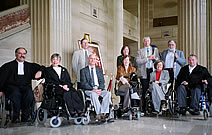Act Now

Empower U: Learn to Access Your Disability Rights Training on Canadian Human Rights, the Convention on the Rights of Persons with Disabilities (CRPD) and its Optional Protocol (OP) training aims to increase awareness of how to address discrimination using more familiar Canadian human rights laws such as Human Rights Codes and the newer international Convention on the Rights of Persons with Disabilities (CRPD). This is training for persons with disabilities by persons with disabilities. The training is part of a project funded by Employment and Social Development Canada and implemented by the Council of Canadians with Disabilities (CCD) in collaboration with Canadian Multicultural Disability Centre Inc. (CMDCI), Citizens With Disabilities – Ontario (CWDO), Manitoba League of Persons with Disabilities (MLPD) and National Educational Association of Disabled Students (NEADS). Read more.
Sign Up for our monthly digest
A monthly newsletter from CCD about what is happening in the community
Federal Court of Appeal Tells Canadians with Disabilities Separate is Equal
Related Documents
December 14, 2018
VIA RAIL SELECTS SIEMENS CANADA TO REPLACE ITS QUÉBEC-WINDSOR CORRIDOR FLEET
January 10, 2008
Reaction to Landmark Canadian Transportation Agency Decision: Disabled Canadians Jubilant to Have Transport Barrier Removed
March 23, 2007
Canadians With Disabilities Celebrate Supreme Court Decision
For Immediate Release
March 15, 2005
The Federal Court of Appeal recently handed down a ruling in CCD's ongoing battle to make VIA Rail's Renaissance cars accessible that denies the equality rights of Canadians with disabilities. The decision does not dispute the fact that VIA's Renaissance cars are inaccessible and present barriers to Canadians with disabilities. What the Court did was allow VIA's appeal of the Canadian Transportation Agency decision that found 14 barriers for people with disabilities. The Court in essence says that the Agency erred by not looking at the whole "network" of passenger services and determining how that "network" could overcome the barriers caused by the Renaissance cars.
"Canadians with disabilities have been told that they cannot have full access, Canadians with disabilities have been told by the Court that it does not matter if the Renaissance cars are inaccessible, as long as some part of the system is accessible. One judge even suggests that an accessible train once or twice a week may be okay. Is this equality of opportunity? Would this be considered acceptable for any other group? What if women or Aboriginal people were told they could only travel on certain trains once a week, would we consider that acceptable?" asked Marie White, CCD National Chairperson.
In 2000 the Government of Canada gave VIA Rail new money to purchase new passenger rail cars. The Minister of Transport at that time promised Canadians with disabilities that whatever was purchased would be accessible. Yet, VIA Rail purchased 139 used surplus cars from Alstrom in France - cars designed for the Chunnel and thus narrower than the standard passenger rail car in Canada. These cars were refused a license in Britain because they were inaccessible. Canadians with disabilities therefore have been put in a position of having to fight to ensure that there is an accessible washroom and tie down area in the coach cars for persons who use wheelchairs, that the doorways are wide enough to ensure easy access and that the so called "accessible suite" is fully accessible. Canadians with disabilities have not at present challenged the totally inaccessible sleeper car.
"CCD calls on Minister Lapierre to intervene and make sure that the promise made to Canadians with disabilities is kept," said Eric Norman, a member of CCD's Transportation Committee. "In the last election, the Liberal Party asked Canadians to re-elect them because they would keep their promises and deliver on their commitments. What about the promise that these cars would be accessible? Was that just more empty words?" asks Laurie Beachell, CCD National Coordinator.
CCD sees the VIA Rail issue as a significant erosion of access. CCD views the Court of Appeal decision as an erosion of equality. Canadians with disabilities are being told that they are not equal citizens in this country. CCD and other disability groups do not accept these regressive actions. "We have tried to work collaboratively with government but frankly we see little in the way of results. CCD wants the introduction of strong accessibility regulations. We no longer trust the "good intentions" and "rhetoric" of either the industry or the government," said Pat Danforth Chair of CCD's Transportation Committee.
CCD has recently conducted a study of transportation accessibility in Britain, Europe, United States and Australia and compared it to Canadian access standards. Canada is by far the least accessible and progressive. CCD's report "Moving Backward: Canada's State of Transportation Accessibility in An International Context" clearly documents the erosion of access in Canada. The report is available on CCD's website at www.ccdonline.ca
- 30 -
For More Information Contact:
Marie White - National Chairperson (709) 739-8233
Eric Norman - Transportation Committee Member (709) 256-8630
Laurie Beachell - National Coordinator (204) 947-0303

CCD wins VIA Rail case at the Supreme Court of Canada on March 23, 2007.
